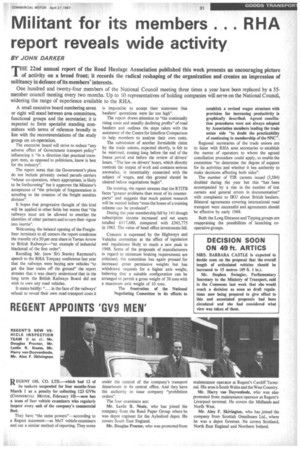Militant for its members . . . RHA report reveals wide activity .
Page 33

If you've noticed an error in this article please click here to report it so we can fix it.
BY JOHN DARKER rill;22nd annual report of the Road Haulage Association published this week presents an encouraging picture activity on a broad front; it records the radical reshaping of the organization and creates an impression of militancy in defence of its members' interests.
One hundred and twenty-four members of the National Council meeting three times a year have been replaced by a 55member council meeting every two months. Up to 10 representatives of holding companies will serve on the National Council, widening the range of experience available to the RHA.
A small executive board numbering seven or eight will stand between area committees, functional groups and the secretariat; it is expected to form specialist standing committees with terms of reference broadly in line with the recommendations of the study group on co-operation.
The executive board will strive to reduce "any adverse effect of Government transport policy" influencing it "in a direction that practical transport men, as opposed to politicians, know is best for the industry".
The report notes that the Government's plans do not include privately owned parcels carriers "whose co-operation, where appropriate, is likely to be forthcoming" but it approves the Minister's acceptance of "the principle of fragmentation in acceding to the creation of the freight sundries division".
It hopes that progressive thought of this kind will be applied in other fields but warns that "the railways must not be allowed to smother the identities of other partners and to turn their vigour into inertia".
Welcoming the belated opening of the Freightliner terminals to all corners the report condemns the transfer of a 50 per cent share in Tartan Arrow to British Railways—"an example of industrial blackmail of the first order".
Recalling Mr. (now Sir) Stanley Raymond's speech to the RHA Torquay conference last year that the railways were buying new vehicles "to get the liner trains off the ground" the report stresses that it was dearly understood that in the long term the British Railways Board did not wish to own any road vehicles.
It states baldly: "... in the face of the railways' refusal to reveal their own road transport costs it is impossible to accept their statement that hauliers' quotations were far too high".
The report draws attention to "the continually rising costs and steadily declining profits" of road hauliers and outlines the steps taken with the assistance of the Centre for Interfirm Comparison to help members to analyse their own costs.
The submission of another formidable claim by the trade unions, expected shortly, is felt to be mistimed, coming long before the end of the freeze period and before the review of drivers' hours. "The law on drivers' hours, which directly controls the output of work and contains serious anomalies, is inextricably connected with the subject of wages, and this ground should be cleared before negotiations begin".
On training, the report stresses that the RTITB faces "greater problems than most of its counterparts" and suggests that much patient research will be needed before "even the bones of a training scheme can be produced".
During the year membership fell by 141 though subscription income increased and net assets totalled £417,480, compared with £365,775 in 1965. The value of head office investments fell.
Concern is expressed by the Highways and Vehicles committee at the effect of legislation and regulations likely to reach a new peak in 1968. Some of the proposals of manufacturers in regard to minimtun braking requirements are criticised; the committee has again pressed for increased gross permissive weights but has withdrawn requests for a higher axle weight, believing that a suitable configuration can be arranged to permit a gross weight of 38 tons with a maximum axle weight of 10 tons.
The frustration of the National Negotiating Committee in its efforts to establish a revised wages structure with provision for increasing productivity is graphically described. Agreed conciliation procedures were not always adopted by Association members leading the trade union side "to doubt the practicability of continuing in membership of the NNC".
Regional secretaries of the trade unions are to liaise with RHA area secretaries to establish the names of operators to whom the agreed conciliation procedure could apply, to enable the committee "to determine the degree of support for its activities and whether it has authority to make decisions affecting both sides".
The number of TIR carnets issued (3,584) doubled during the year but this "has been accompanied by a rise in the number of lost carnets and general errors in documentation" with complaints to IRU about British hauliers. Bilateral agreements covering international road transport were successful and agreements should be effective by early 1968.
Both the Long Distance and Tipping groups are reappraising the possibilities of launching cooperative groups.




































































































































